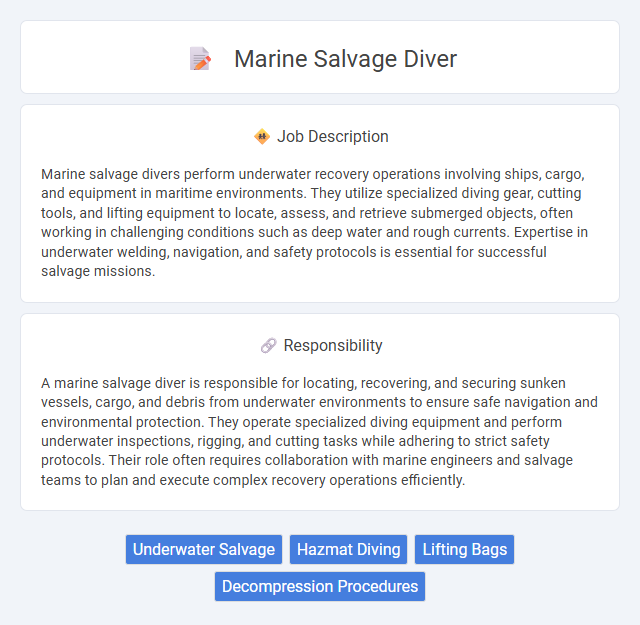
Marine salvage divers perform underwater recovery operations involving ships, cargo, and equipment in maritime environments. They utilize specialized diving gear, cutting tools, and lifting equipment to locate, assess, and retrieve submerged objects, often working in challenging conditions such as deep water and rough currents. Expertise in underwater welding, navigation, and safety protocols is essential for successful salvage missions.
Individuals with strong physical fitness and excellent swimming skills will likely be suitable for a marine salvage diver role, given the demanding underwater work conditions. Those who can remain calm under pressure and possess good problem-solving abilities may adapt well to the unpredictable and hazardous environments encountered during salvage operations. People with respiratory or cardiovascular issues might find this job unsuitable due to the strenuous nature and possible exposure to extreme underwater pressures.
Qualification
Marine salvage divers require rigorous training in commercial diving, including certification from recognized bodies such as the Association of Diving Contractors International (ADCI) or the International Maritime Contractors Association (IMCA). Essential qualifications include proficiency in underwater welding, knowledge of hazardous material handling, and strong skills in navigation and underwater communication systems. Physical fitness, experience with compressed air and mixed gas diving, and adherence to safety protocols are critical for successful performance in marine salvage operations.
Responsibility
A marine salvage diver is responsible for locating, recovering, and securing sunken vessels, cargo, and debris from underwater environments to ensure safe navigation and environmental protection. They operate specialized diving equipment and perform underwater inspections, rigging, and cutting tasks while adhering to strict safety protocols. Their role often requires collaboration with marine engineers and salvage teams to plan and execute complex recovery operations efficiently.
Benefit
Marine salvage diver jobs probably offer substantial financial benefits due to the high-risk nature of the work and specialized skills required. The position likely provides unique opportunities for career advancement in maritime industries and exposure to advanced underwater technology. Divers may benefit from developing valuable experience in emergency response and environmental protection efforts, which could enhance employability in related fields.
Challenge
Marine salvage divers likely face physical and environmental challenges due to strong currents, limited visibility, and hazardous underwater conditions. The work probably demands high levels of technical skill and adaptability to manage complex salvage operations involving heavy equipment and fragile structures. Safety risks, including decompression sickness and underwater hazards, are expected to add complexity to this demanding profession.
Career Advancement
Marine salvage divers gain expertise in underwater recovery and repair, advancing through certifications such as commercial diving and hazardous environment training. Career progression often leads to supervisory roles, project management, or specialized fields like underwater welding and inspection. Mastery in sophisticated equipment operation and safety protocols significantly enhances opportunities for leadership positions and higher salaries.
Key Terms
Underwater Salvage
Marine salvage divers specialize in underwater salvage operations, recovering sunken vessels, cargo, and debris from oceans, rivers, and lakes. They utilize advanced diving equipment, sonar technology, and cutting-edge cutting and welding tools to safely dismantle and retrieve submerged objects. Expertise in hazardous environments and knowledge of maritime laws ensure effective and compliant salvage missions.
Hazmat Diving
Marine salvage divers specializing in Hazmat diving perform critical underwater operations involving hazardous materials such as fuel, chemicals, and toxic substances. They utilize specialized equipment and protocols to safely locate, contain, and recover pollutants, preventing environmental damage and ensuring maritime safety. Expertise in hazardous material handling, underwater welding, and emergency response is essential for mitigating risks during complex salvage missions.
Lifting Bags
Marine salvage divers specialize in underwater recovery operations using lifting bags to raise sunken objects. These inflatable devices provide buoyant force, enabling divers to move heavy debris or wreckage safely to the surface. Expertise in calculating load capacity, proper bag placement, and controlled inflation is critical to prevent accidents and ensure mission success.
Decompression Procedures
Marine salvage divers strictly follow decompression procedures to prevent decompression sickness caused by rapid ascent and nitrogen bubble formation in tissues. Precise adherence to decompression tables and the use of dive computers ensure controlled ascent rates and staged stops, allowing dissolved gases to safely off-gas. Mastery of these procedures is critical for maintaining diver safety during deep or prolonged salvage operations involving complex underwater structures.
 kuljobs.com
kuljobs.com